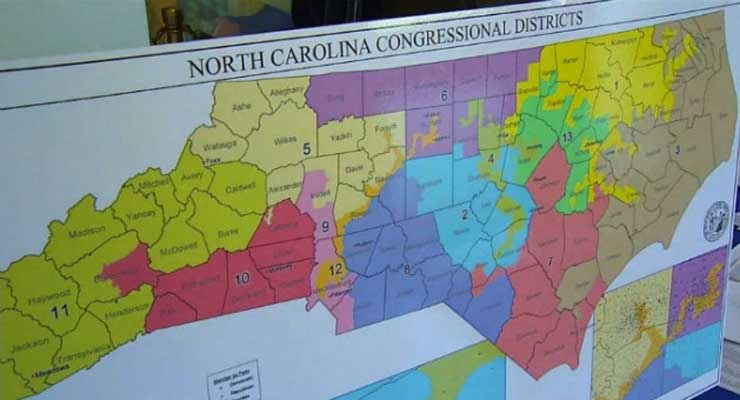
Even after proposal rejected for bias, the North Carolina district boundaries fight goes on
From Ballot Access News:
On February 29, the plaintiffs in Harris v McCrory, the North Carolina lawsuit over U.S. House district boundaries, filed this brief in Harris v McCrory, m.d., 1:13cv-949. They argue that the new districts approved by the legislature last month represent an unconstitutional gerrymander.
See especially page 30 and the following pages, where the plaintiffs remind the Court that the U.S. Supreme Court has said in the past that extreme partisan gerrymandering is unconstitutional. This is generally forgotten, because the U.S. Supreme Court has not yet invalidated any state’s districts on the grounds of partisan gerrymandering, because the Court has never agreed on an objective standard to measure it. But, this case may be the first. The legislators who drew the new districts last month openly admitted that they drew a partisan gerrymander. North Carolina has 13 districts. The Republican majority in the legislature drew districts that are virtually guaranteed to produce Republican winners in 10 of those districts.
Also, from Election Law Blog:
While much of the brief is about how the NC legislature’s new plan is no cure for the earlier redistricting plan found to be a racial gerrymander, perhaps what is most interesting is the discussion of how open and blatant the NC legislators were about drawing line to partisan advantage.
From the brief: Lest there be any doubt as to whether this is a partisan gerrymander, one need only ask Lewis: “I acknowledge freely that this would be a political gerrymander.” Hamilton Decl., Ex. 3 (Tr. 46:5-11); see also id. (Tr. 51:12-52:1) (“[W]e want to make clear that we . . . are going to use political data in drawing this map. It is to gain partisan advantage on the map. I want that criteria to be clearly stated and understood.. . . . I’m making clear that our intent is to use — is to use the political data we have to our partisan advantage.”)….
The General Assembly’s purported criteria only confirm Lewis’s stated intent to maximize partisan advantage. In a criterion titled simply “Partisan Advantage,” the General Assembly provides: The partisan makeup of the congressional delegation under the enacted plan is 10 Republicans and 3 Democrats. The Committee shall make reasonable efforts to construct districts in the… Plan to maintain the current partisan makeup of North Carolina’s congressional delegation.
This, in a state that is split roughly evenly between Democrats and Republicans. Should be interesting.
Leave a Reply